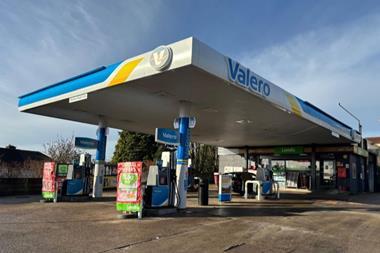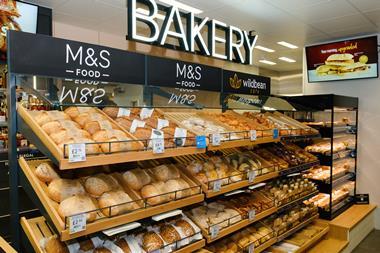MRH (GB) is, by some distance, the biggest independent fuel retailer in the UK. Hence its number one ranking on Forecourt Trader’s latest Top 50 Indies listing - where it looks like staying for some time to come.
It currently has 295 sites, with a fuel volume totalling 1.1 billion litres a year. However, that is only part of the story.
It also has a fuel distribution operation, serving 135 Pace dealers, as well as a commercial fuel business selling 600 million litres of fuel per annum, to households, farms, light industry, national accounts and marine vessels on the Thames.
Heading up this success story is the extremely amiable and pragmatic Graham Peacock, who, from the outset of this interview is adamant that it is very much a team business.
"MRH is a team of experienced people - it’s not about one person. The team is full of people as experienced as anybody in our industry, including all the oil companies.
"It has been very important to us that oil companies have been prepared to release experienced managers and we’ve been more than happy to employ them!"
Indeed joining him in the interview is John Lynn, now managing director of MRH. Only a few years ago I was interviewing him in his role as a top Europe downstream executive at Texaco.
Other notable former oil company recruits to the MRH cause include Guy Vigar (Texaco), Dennis Poole (Total), and Ian Otter (BP). Brian Handley (Fina/Total) played a key role in running the Pace business for a number of years, but has now moved on to new challenges.
"These people hit the ground running," stresses Graham. "You don’t have to explain anything to them. They know their way around a petrol station and know how to negotiate a contract because they’ve been doing it for years. We also have valued staff who have been with us for over 30 years and an excellent complement of people who joined us with the Q8 acquisition."
Most of them, he says, have clearly relished getting out of increasing large company bureaucracy - a point reinforced by John himself, who joined MRH in January 2008: "This has been completely different for me," he says. "It’s about speedy decision making, a low-cost operation, being entrepreneurial, and it’s about growth - something that hasn’t been a feature of UK oil companies for some time!"
Experience for Graham has been acquired through 40 years of hard work in the petrol retailing industry, starting full time in 1968, working for the late Alan Pond. Alan was one of the foremost innovators and entrepreneurs in our industry during the ’60s, ’70s and ’80s. For Graham, it has been a natural progression as he has worked in every part of petrol retailing for 40 years.
== Malthurst emerges ==
By the mid-90s, the business, Oakstead, had hit the buffers, a situation largely attributed to Esso’s infamous Pricewatch campaign.
But in 1997, Graham was one of a number of people - including Susan Tobbell, the former finance director at Oakstead - that got together and formed Malthurst. As Graham says: "Every company should have an FD like Sue. Her understanding of numbers is second to none. She has a vice-like grip on the purse strings and has been instrumental in the success of the company.
"We started off with £1,000, and the benefit of a huge amount of experience. And then it grew..."
The company’s first sites were 25 petrol stations leased from Texaco.
"They weren’t the greatest sites but they became the nucleus of great things," says Graham. "We ran them as commission operations as we do now with our entire network. We’re not into direct management and would have to be convinced of its merits before changing.
The company grew by degrees, buying and selling the occasional site depending on the opportunity.
"Our benefit was that we knew what we were doing, and also during that period until about 2003/04, petrol filling station values were somewhat depressed - certainly compared to what they are now," explains Graham. "So we could buy some decent sites for around £200,000. There were quite a few available because there was a lot of contraction going on in the industry and people didn’t want petrol stations. As we acquired more sites, we stripped out some of the tenanted sites and handed them back to Texaco. So the network remained at about 30-40 sites.
"We didn’t do anything special with them - we just ran them. There were no goals, we just wanted to have a business that paid the wages."
Then in 2003/04 came an intense oil company de-capitalisation period, when companies like Texaco and BP began selling many sites.
"At the time we’d just started a relationship with a property investment company, the William Pears Group, which allowed us to buy 30 sites from BP in one hit, which at the time was great because we were going to double the size of the company and prices were reasonable," says Graham.
The deal worked out well for Malthurst, and then in spring 2004 Kuwait Petroleum put its UK operation on the market. "We had a meeting with the Pears group and got the okay to go for it, which we did," says Graham. "I always thought we’d come a brave second. I was never more amazed than when I received a call one day and was told I’d just bought an oil company! We bought it because it had a good network of filling stations, with freehold offices in Staines and a fuel distribution business. It gave us 75 petrol stations, 140 dealers, plus 12 depots and 120 trucks. We didn’t have external valuations, we did all the work ourselves. The Pears management trusted us, funded the acquisition and were excellent partners."
The Malthurst team re-branded the sites from Q8 to a mixture of BP, Texaco, Jet and Total, cut out some costs, did some re-organisation, and within the first 12 months it was making money. According to Graham, Kuwait Petroleum had not made money during its 18 years in the UK. So how did Malthurst turn it round? "We just executed ordinary, proper, business practices. Essentially oil companies don’t do things that small independent businesses have to do - because if one of us had consistently lost money over 18 years we’d have gone bust."
Another core area of expertise for MRH is property management and development. As well as owning and leasing sites to operate, MRH has also built and developed key locations for leasing to major oil companies and others. Then a year or so later Texaco was looking to disinvest its equity sites in the UK, and Malthurst and Pace bought about 100. Then it acquired sites here and there, including 25 sites from Fuelforce, bringing its network to 250-260 sites.
That was around three years ago. At the time Malthurst and Pace were run separately because there were different shareholdings in both companies. But in October 2007 it took the opportunity to buy out all the other external shareholders within Pace (funded by HSBC) and formalised the group into one organisation called MRH (GB) Ltd. The process allowed directors Brian Thompson and Ed Bird to retire, and the Pears group to take its capital out - after a successful involvement with the group.
"That was heavy going," says Graham. "It was the start of the credit crunch, but because HSBC had committed to the deal much earlier - it went ahead."
Then in March 2008, the four MRH (GB) shareholders - Graham Peacock, Susan Tobbell, Fraser Duffin and Andrew Jackson - sold off an amount of the shareholding, around 38%, to Barclays Private Equity.
"During 2007/08, with another hike in petrol filling station values, the company only bought when a good site came along "at a realistic price". It also sold off a few. And then the recession began to take hold.
"In the second half of 2008 we think demand contracted about 6% - that’s people sharing cars, cancelling journeys, buying more efficient cars, and so on," says John. "We then think there was a migration from our business to other providers - ie the supermarkets. Grocery voucher cross-promotions, keen pricing, media campaigns - and maximising key issues like coming through the pound price break - all had an effect.
"Having said that, with the market price coming down from $147 a barrel oil to $30-40 a barrel, we were all able to experience reasonably robust margins in the last part of the year, to make up for the volume decline. Then we all go off for Christmas and come back to a dismal January. Now we believe we’re really beginning to see the recession bite. Problems like the fall off in car manufacturing and household retailers going into administration, together with tightened family budgets have affected fuel sales. All these recessionary issues are coming to bear."
MRH however is prepared. "We are making money out of fuel retailing, but there are probably some in our industry that aren’t taking account of all costs," says Graham.
"MRH has always been a low-cost operation, but in times like we are witnessing currently, prudent management must have a cost-reduction plan in place. We’re going through everything.
"If you’ve been running like mad for 10 years in order to grow, there will always be opportunities to re-look at costs when things are a bit quieter. And the little wins add up to something that makes a difference."
A major project being undertaken this year is to knit the Pace and Malthurst networks together, which will involve investment in IT, territory optimisation, standardised accounting and harmonised working practices.
Also, Pace has moved out of the old Q8 office in Staines, down the road to a new smaller office in Egham.
While Graham’s constant reference to low-cost operations might suggest a lack of investment in the retail network, that is not the case at all.
"There has been a substantial reinvestment budget every year," stresses Graham. "We keep our sites well maintained but they are not gin palaces. We have a high proportion of excellent sites in excellent locations.
"We can get more out of our shops and that’s always been part of the long-term programme. There are any number of planning applications in now with some for complete redevelopments. We have an in-house format which we call our silver and purple refit and our attitude to shops is about making a sensible-sized investment to freshen things up and keep the trade moving. There is more rubbish talked about shops than almost any other subject in our industry, because people look at the turnover and not necessarily at all the costs involved - such as wastage, staffing, pilferage, rates, you name it. We don’t decry anyone who’s doing a big shop format, because that’s what suits them. But we can’t do that across 300 sites. We don’t need big flashy shops - and our best return-on-investment probably comes from shops no bigger than 500 sq ft. Having said that, we do operate larger sites and have six very successful BP Connect sites.
"We look at each individual site, and make it work as efficiently as possible, but no frills. It has to fulfil the core needs - cigarettes, confectionery, chilled food and drinks; our team make unannounced visits with site excellence check sheets and are very hands-on in rectifying problems. We do the basics well, but there’s no froth."
Where MRH has no qualms about spending money is in the key area underneath the forecourt - on tank gauges, real time wet-stock monitoring, environmental issues and so on.
"I think we are at the forefront of investment in this area," stresses Graham "An area where we could not only be losing stock, but be hit with substantial costs if an incident were to occur."
A major opportunity on the horizon for MRH is that the supply contracts on half its network - about 150 sites - are coming up for renewal next year.
"It’s the largest dealer contract that’s ever been out in the UK," says John. "We’ve already started talking to our suppliers about next year and what their aspirations are. For those suppliers that want to be in the dealer business, it’s a one-off opportunity!"
Another area being seriously considered by MRH is providing finance for retailers wishing to acquire petrol filling stations. "One of the reasons people aren’t buying petrol stations at the moment, is because they can’t get money from the banks," says Graham. "If there’s a sound business opportunity being wasted because of funding, then maybe there’s a win-win situation for MRH and the retailer. We have substantial funds, we understand the business and we can make decisions almost instantly."
With the recession tightening its grip, the MRH team is as concerned as anyone about what the future holds.
"We may be in a better industry to survive it compared to selling carpets or motor cars. But that still doesn’t make it easy. I think the industry is going to be hit hard by the new rates revaluation this year, more government legislation, more bureaucracy; and Shell and the hypermarkets are going to continue to make life hard for petrol retailers. Then there’s biofuels - how many filters are going to have to be cleaned out every year? It’s becoming a problem. The choice of fuel suppliers will also be more limited in future."
Despite all this, Graham makes it clear he still enjoys the business.
"It’s exciting growing businesses," he says. "We want to grow MRH - but not at any cost. We were lucky that we bought our sites at the right time - although we didn’t realise it then! We’re fortunate - we make serious money and we have a laugh as well. Most of all the success of any company is working with a group of people who are committed to growing the number in the bottom right hand corner. Now, more than ever, profits are key and cash is king."
----
=== Facts & figures ===
MRH (GB) LTD
Site numbers: 295 co-owned/operated (plus 135 Pace dealers, 18 fuel depots)
Fuel volume: 1.1bn lpa (excl 104mlpa Pace dealers, 600mlpa commercial) group
Turnover: £1.33bn
Shop turnover: £126m
Fuel brands: BP, Esso, Jet, Shell, Texaco, Total
Head office: Epping, Essex
Directors: Graham Peacock (chief executive officer); Susan Tobbell (finance director); John Lynn (managing director); Rob Myers (non executive director); Dennis Poole (non executive chairman)
----
=== oil distribution business ===
MRH (GB) has a 450mlpa oil distribution business. Its operations range from supplying 1,000 litres of heating oil to the domestic market, to supplying organisations such as the Ministry of Defence, the National Health Trust and the Farming Co-operatives, which can be 6-10mlpa accounts. It also employs 35 heating engineers.
The company also has a marine business, which came as part of the Kuwait Petroleum package. It supplies boats going up and down the Thames, and includes two jetties, one at St Katherine’s Dock and one at Westminster Pier.



























No comments yet